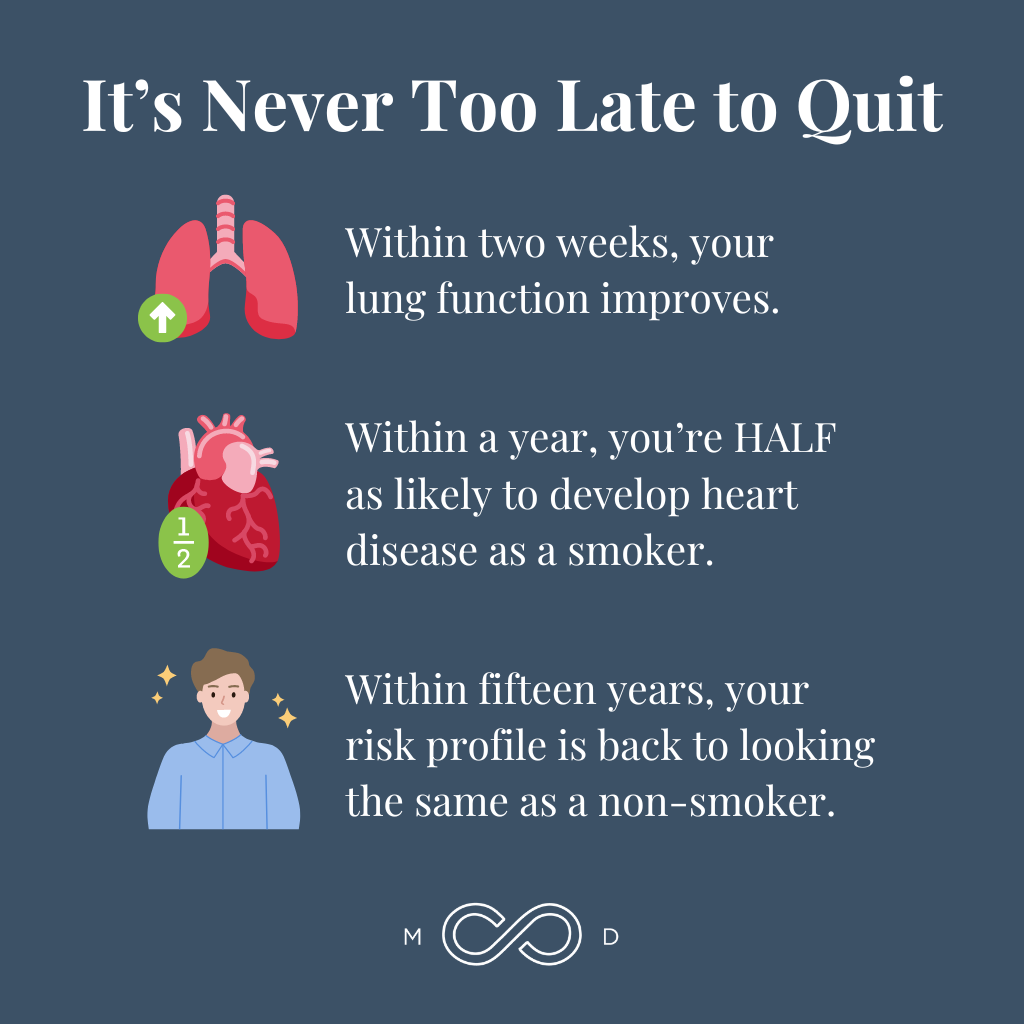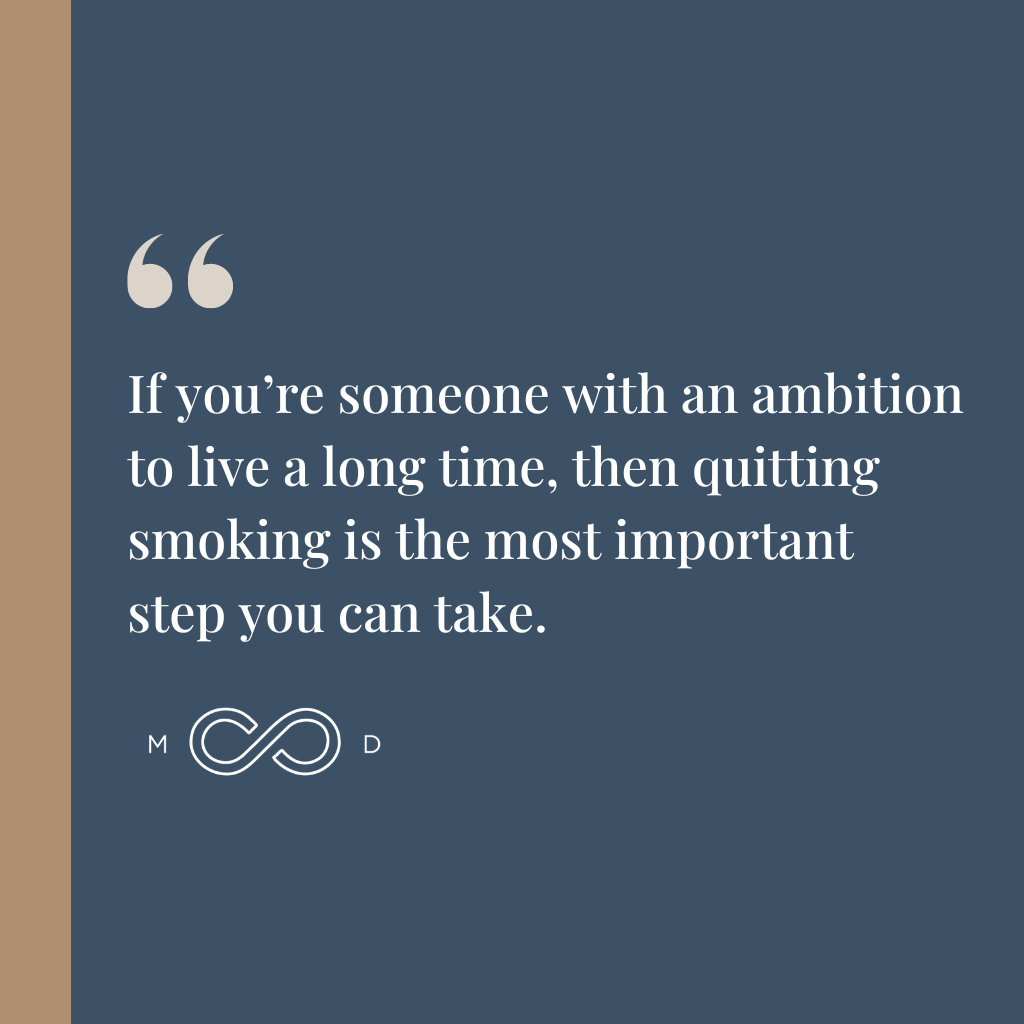We’ve touched on the dangers of smoking in the past, but here I’d like to take some time to give this elephant in the room its due.
It’s been abundantly clear for some time that smoking poses tremendous dangers to human health, a fact that has spurred a nationwide decline in the habit. However, nearly 12% of American adults still smoke cigarettes, and that’s not including other forms of tobacco delivery and underage usage.
So while rates have declined, we still need to talk about smoking if we’re going to have a conversation about risk stratification for long-term health.
Playing Frogger With Your Health
Skeptical smokers sometimes hold up anecdotal arguments as a shield against the prospect of quitting. In other words, they hold fast to the story of their great-aunt’s cousin, who smoked until she was 90 and died peacefully in her sleep.
The problem isn’t that anyone’s lying or that Great-Aunt Elsie’s cousin was an alien; it’s that this is far and away the exception to a very deadly rule.
It’s something like a crowd of people darting across a busy freeway. Sure, a few make it across — but most end up pancaked on the street.
It’s Not Just Lung Cancer
Smoking-related diseases claim over 480,000 lives in the U.S. annually, and that’s not just from lung cancer. Yes, smoking does increase your lung cancer risk, but contrary to popular belief, lung cancer isn’t what takes out most smokers (only about one in 10).
The specter of lung cancer often overshadows the other serious outcomes provoked by smoking, including heart disease, stroke, dementia, and other types of cancers. In other words, all the leading diseases that take humans off this planet. So while not all smokers get lung cancer, nearly all will develop some form of significant health consequence.
Smoking is the #1 leading cause of preventable death on the planet. But the keyword here is preventable.
It Really Is Never Too Late to Quit
Smoking remains one of the two most important modifiable risk factors for heart disease, cancer, and a host of other life-altering diseases. (The other is diabetes.)
Now, here’s the good news: If you quit smoking, your body bounces back remarkably quickly. Within two weeks, your lung function improves. Within a year, you’re HALF as likely to develop heart disease as a smoker. Within fifteen years, your risk profile is back to looking the same as a non-smoker.
That’s the resilience of the human body, but remember, you can push it too far. Your body is resilient until it’s not.
If you’re someone with an ambition to live a long time, then quitting smoking is the most important step you can take. There’s no single move better for your health, longevity, and quality of life than quitting smoking; there’s no greater gift to yourself and your family.
That said, I’ll acknowledge right now that quitting is easier said than done. If you’ve struggled to quit before, you’re not a failure. Quitting smoking isn’t quite like quitting most other habits. It involves multiple layers of challenge, not least of which is the physical addiction itself.
But quitting is worth it. So let’s talk about the strategies I’ve seen most often succeed and fail.
How to Quit Smoking: Taper or Cold Turkey?
When a person decides to quit smoking, their big initial question is often whether to taper off or go “cold turkey.” While I don’t claim to be an expert in smoking cessation, I can share with you what I’ve seen work for my patients.
Candidly, the only people I’ve seen successfully quit did the latter. They bought their last pack of cigarettes, and that was it — they just stopped.
Cold. Turkey.
The trouble I’ve seen with tapering is that people wean themselves down a bit and then a little more, but the urge and opportunity linger. So, the person has to maintain iron self-control to resist the temptation to increase again — because temptation remains their companion day in and day out.
Cold turkey is, of course, a challenge as well, which is why you need a support system around you for motivation, accountability, and help. It’s also important to take time to really consider the reasons you want to quit smoking. Is it your own health? Your family’s? Your longevity? Athletic performance? Whatever it is, identify it and keep it in front of you for those moments when you need an extra boost.
Find your reasons. Find your team. Then keep trying until you nail it. It’s THE most important thing you can do for your health.
You deserve it, and I believe you can do it.

Dr. Aaron Wenzel is a concierge physician specializing in the care of fast-moving entrepreneurs, executives, and public figures in the Nashville, TN area. Dr. Wenzel’s diverse life experience and extensive training in family medicine, emergency care, nutrition, and hormone replacement therapies give him the unique platform to provide unmatched care for his patients.









